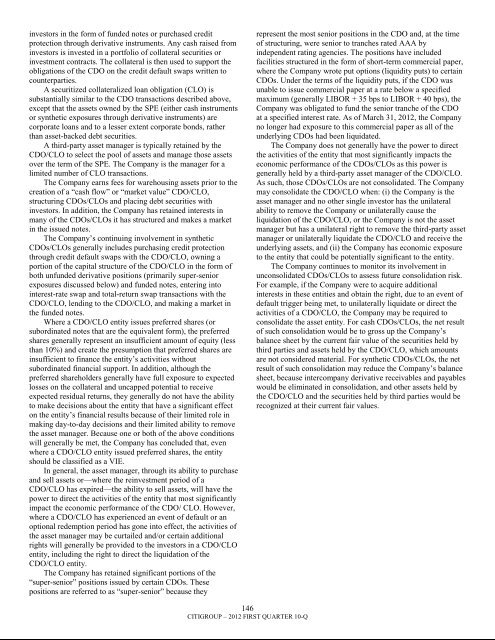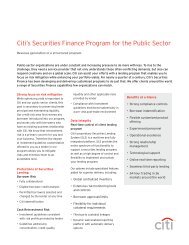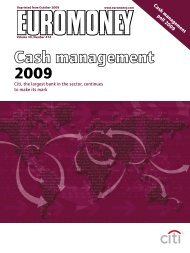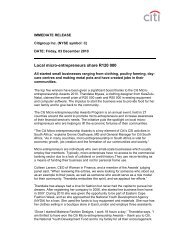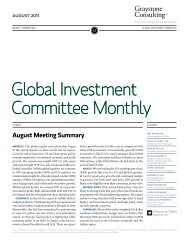conduit has obtained a letter of credit from the Company, whichneeds to be sized to be at least 8–10% of the conduit‘s assetswith a floor of $200 million. The letters of credit provided bythe Company to the consolidated conduits total approximately$1.7 <strong>billion</strong>. The net result across all multi-seller conduitsadministered by the Company is that, in the event defaultedassets exceed the transaction-specific credit enhancementsdescribed above, any losses in each conduit are allocated first tothe Company and then the commercial paper investors.The Company also provides the conduits with two forms ofliquidity agreements that are used to provide funding to theconduits in the event of a market disruption, among other events.Each asset of the conduits is supported by a transaction-specificliquidity facility in the form of an asset purchase agreement(APA). Under the APA, the Company has generally agreed topurchase non-defaulted eligible receivables from the conduit atpar. The APA is not generally designed to provide credit supportto the conduit, as it generally does not permit the purchase ofdefaulted or impaired assets. Any funding under the APA willlikely subject the underlying borrower to the conduits toincreased interest costs. In addition, the Company provides theconduits with program-wide liquidity in the form of short-termlending commitments. Under these commitments, the Companyhas agreed to lend to the conduits in the event of a short-termdisruption in the commercial paper market, subject to specifiedconditions. The Company receives fees for providing both typesof liquidity agreements and considers these fees to be on fairmarket terms.Finally, the Company is one of several named dealers in thecommercial paper issued by the conduits and earns a marketbasedfee for providing such services. Along with third-partydealers, the Company makes a market in the commercial paperand may from time to time fund commercial paper pending saleto a third party. On specific dates with less liquidity in themarket, the Company may hold in inventory commercial paperissued by conduits administered by the Company, as well asconduits administered by third parties. The amount ofcommercial paper issued by its administered conduits held ininventory fluctuates based on market conditions and activity. Asof March 31, 2012, the Company owned $4.6 <strong>billion</strong> and $199million of the commercial paper issued by its consolidated andunconsolidated administered conduits, respectively.With the exception of the government-guaranteed loanconduit described below, the asset-backed commercial paperconduits are consolidated by the Company. The Companydetermined that through its role as administrator it had thepower to direct the activities that most significantly impactedthe entities‘ economic performance. These powers included itsability to structure and approve the assets purchased by theconduits, its ongoing surveillance and credit mitigation activities,and its liability management. In addition, as a result of all theCompany‘s involvement described above, it was concluded thatthe Company had an economic interest that could potentially besignificant. However, the assets and liabilities of the conduitsare separate and apart from those of <strong>Citigroup</strong>. No assets of anyconduit are available to satisfy the creditors of <strong>Citigroup</strong> or anyof its other subsidiaries.The Company administers one conduit that originates loansto third-party borrowers and those obligations are fullyguaranteed primarily by AAA-rated government agencies thatsupport export and development financing programs. Theeconomic performance of this government-guaranteed loanconduit is most significantly impacted by the performance of itsunderlying assets. The guarantors must approve each loan heldby the entity and the guarantors have the ability (throughestablishment of the servicing terms to direct default mitigationand to purchase defaulted loans) to manage the conduit‘s loansthat become delinquent to improve the economic performanceof the conduit. Because the Company does not have the powerto direct the activities of this government-guaranteed loanconduit that most significantly impact the economicperformance of the entity, it was concluded that the Companyshould not consolidate the entity. The total notional exposureunder the program-wide liquidity agreement for the Company‘sunconsolidated administered conduit as of March 31, 2012 is$0.6 <strong>billion</strong>. The program-wide liquidity agreement, along witheach asset APA, is considered in the Company‘s maximumexposure to loss to the unconsolidated administered conduit.As of March 31, 2012, this unconsolidated governmentguaranteedloan conduit held assets and funding commitmentsof approximately $10.5 <strong>billion</strong>.Third-Party Commercial Paper ConduitsThe Company also provides liquidity facilities to single- andmulti-seller conduits sponsored by third parties. These conduitsare independently owned and managed and invest in a variety ofasset classes, depending on the nature of the conduit. Thefacilities provided by the Company typically represent a smallportion of the total liquidity facilities obtained by each conduit,and are collateralized by the assets of each conduit. As of March31, 2012, the Company had no involvement in third-partycommercial paper conduits. The Company is not the party thathas the power to direct the activities of these conduits that mostsignificantly impact their economic performance and thus doesnot consolidate them.Collateralized Debt and Loan ObligationsA securitized collateralized debt obligation (CDO) is an SPEthat purchases a pool of assets consisting of asset-backedsecurities and synthetic exposures through derivatives on assetbackedsecurities and issues multiple tranches of equity andnotes to investors.A cash CDO, or arbitrage CDO, is a CDO designed to takeadvantage of the difference between the yield on a portfolio ofselected assets, typically residential mortgage-backed securities,and the cost of funding the CDO through the sale of notes toinvestors. ―Cash flow‖ CDOs are entities in which the CDOpasses on cash flows from a pool of assets, while ―marketvalue‖ CDOs pay to investors the market value of the pool ofassets owned by the CDO at maturity. In these transactions, allof the equity and notes issued by the CDO are funded, as thecash is needed to purchase the debt securities.A synthetic CDO is similar to a cash CDO, except that theCDO obtains exposure to all or a portion of the referenced assetssynthetically through derivative instruments, such as creditdefault swaps. Because the CDO does not need to raise cashsufficient to purchase the entire referenced portfolio, asubstantial portion of the senior tranches of risk is typicallypassed on to CDO investors in the form of unfunded liabilitiesor derivative instruments. Thus, the CDO writes creditprotection on select referenced debt securities to the Companyor third parties and the risk is then passed on to the CDO145CITIGROUP – 2012 FIRST QUARTER 10-Q
investors in the form of funded notes or purchased creditprotection through derivative instruments. Any cash raised frominvestors is invested in a portfolio of collateral securities orinvestment contracts. The collateral is then used to support theobligations of the CDO on the credit default swaps written tocounterparties.A securitized collateralized loan obligation (CLO) issubstantially similar to the CDO transactions described above,except that the assets owned by the SPE (either cash instrumentsor synthetic exposures through derivative instruments) arecorporate loans and to a lesser extent corporate bonds, ratherthan asset-backed debt securities.A third-party asset manager is typically retained by theCDO/CLO to select the pool of assets and manage those assetsover the term of the SPE. The Company is the manager for alimited number of CLO transactions.The Company earns fees for warehousing assets prior to thecreation of a ―cash flow‖ or ―market value‖ CDO/CLO,structuring CDOs/CLOs and placing debt securities withinvestors. In addition, the Company has retained interests inmany of the CDOs/CLOs it has structured and makes a marketin the issued notes.The Company‘s continuing involvement in syntheticCDOs/CLOs generally includes purchasing credit protectionthrough credit default swaps with the CDO/CLO, owning aportion of the capital structure of the CDO/CLO in the form ofboth unfunded derivative positions (primarily super-seniorexposures discussed below) and funded notes, entering intointerest-rate swap and total-return swap transactions with theCDO/CLO, lending to the CDO/CLO, and making a market inthe funded notes.Where a CDO/CLO entity issues preferred shares (orsubordinated notes that are the equivalent form), the preferredshares generally represent an insufficient amount of equity (lessthan 10%) and create the presumption that preferred shares areinsufficient to finance the entity‘s activities withoutsubordinated financial support. In addition, although thepreferred shareholders generally have full exposure to expectedlosses on the collateral and uncapped potential to receiveexpected residual returns, they generally do not have the abilityto make decisions about the entity that have a significant effecton the entity‘s financial results because of their limited role inmaking day-to-day decisions and their limited ability to removethe asset manager. Because one or both of the above conditionswill generally be met, the Company has concluded that, evenwhere a CDO/CLO entity issued preferred shares, the entityshould be classified as a VIE.In general, the asset manager, through its ability to purchaseand sell assets or—where the reinvestment period of aCDO/CLO has expired—the ability to sell assets, will have thepower to direct the activities of the entity that most significantlyimpact the economic performance of the CDO/ CLO. However,where a CDO/CLO has experienced an event of default or anoptional redemption period has gone into effect, the activities ofthe asset manager may be curtailed and/or certain additionalrights will generally be provided to the investors in a CDO/CLOentity, including the right to direct the liquidation of theCDO/CLO entity.The Company has retained significant portions of the―super-senior‖ positions issued by certain CDOs. Thesepositions are referred to as ―super-senior‖ because theyrepresent the most senior positions in the CDO and, at the timeof structuring, were senior to tranches rated AAA byindependent rating agencies. The positions have includedfacilities structured in the form of short-term commercial paper,where the Company wrote put options (liquidity puts) to certainCDOs. Under the terms of the liquidity puts, if the CDO wasunable to issue commercial paper at a rate below a specifiedmaximum (generally LIBOR + 35 bps to LIBOR + 40 bps), theCompany was obligated to fund the senior tranche of the CDOat a specified interest rate. As of March 31, 2012, the Companyno longer had exposure to this commercial paper as all of theunderlying CDOs had been liquidated.The Company does not generally have the power to directthe activities of the entity that most significantly impacts theeconomic performance of the CDOs/CLOs as this power isgenerally held by a third-party asset manager of the CDO/CLO.As such, those CDOs/CLOs are not consolidated. The Companymay consolidate the CDO/CLO when: (i) the Company is theasset manager and no other single investor has the unilateralability to remove the Company or unilaterally cause theliquidation of the CDO/CLO, or the Company is not the assetmanager but has a unilateral right to remove the third-party assetmanager or unilaterally liquidate the CDO/CLO and receive theunderlying assets, and (ii) the Company has economic exposureto the entity that could be potentially significant to the entity.The Company continues to monitor its involvement inunconsolidated CDOs/CLOs to assess future consolidation risk.For example, if the Company were to acquire additionalinterests in these entities and obtain the right, due to an event ofdefault trigger being met, to unilaterally liquidate or direct theactivities of a CDO/CLO, the Company may be required toconsolidate the asset entity. For cash CDOs/CLOs, the net resultof such consolidation would be to gross up the Company‘sbalance sheet by the current fair value of the securities held bythird parties and assets held by the CDO/CLO, which amountsare not considered material. For synthetic CDOs/CLOs, the netresult of such consolidation may reduce the Company‘s balancesheet, because intercompany derivative receivables and payableswould be eliminated in consolidation, and other assets held bythe CDO/CLO and the securities held by third parties would berecognized at their current fair values.146CITIGROUP – 2012 FIRST QUARTER 10-Q


